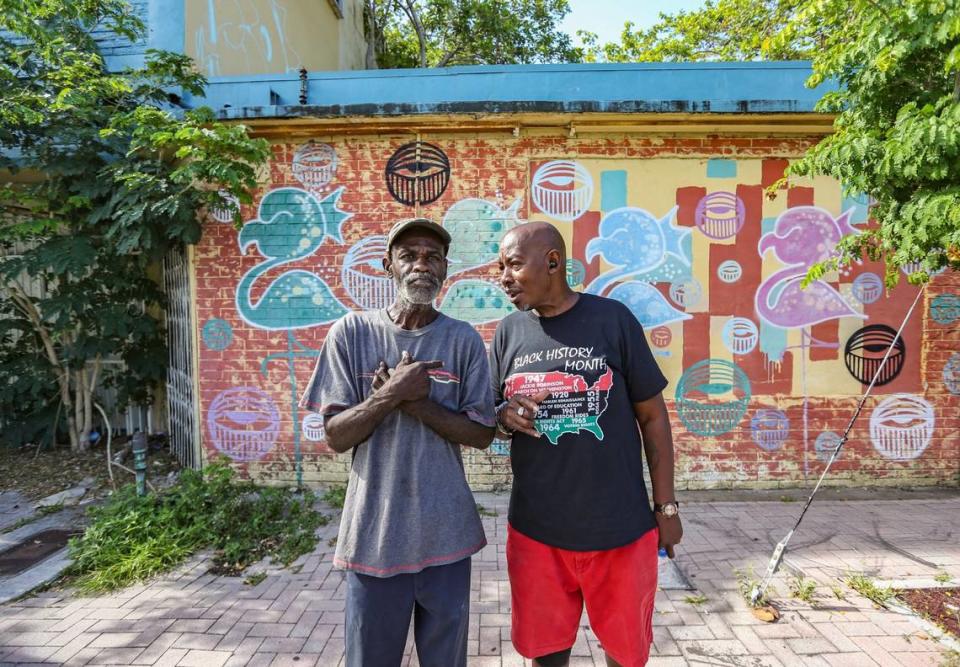Miami’s Little Bahamas faces development pressure. One city official wants to fight it
Miami Commissioner Ken Russell says it is important to fight gentrification in Little Bahamas, the historically Black section of Coconut Grove settled by the city’s pioneers, to keep longtime residents from being displaced and bring back those who have left.
Development pressure is making it difficult to preserve one of Miami’s oldest neighborhoods, says Russell, who has made the issue a priority since he was elected to the City Commission in 2015.
After several unsuccessful attempts, Russell is still hoping to get a proposal passed by the commission in the five months he has left in office.
In an interview with the Miami Herald, Russell said he has a plan — even after a years-long effort to create a new community redevelopment agency to divert future tax revenue toward preservation of the neighborhood was upended in July.
Russell said a combination of funding to preserve single-family homes and zoning changes could help slow the gentrification process and potentially allow residents who have been priced out of the area to return.
“My hope is that all the folks that come here on the weekends for church that don’t live here anymore will have an opportunity to buy, rent, come back if they choose, in sort of a welcome home program,” Russell said.
READ MORE: Miami designates part of Coconut Grove as ‘Little Bahamas’ to honor area’s history
He is not daunted by the short time left in office.
“Since my college days, I’m known as a procrastinator,” he said. “And sometimes we do our best work crunching before the exam.”

Here is what Russell, whose term ends in January, said he is focused on:
▪ Rezoning: He plans to propose changes to the area’s zoning code to require private developers to include affordable housing units in new multi-family buildings. He hopes to sponsor legislation that would mimic the incentives program he helped create for residential towers for a 30-block area north of downtown.
▪ Home renovation: He plans to push for more funding for Rebuilding Together Miami-Dade, a nonprofit based in the Grove that helps property owners with home repairs. Using government funding, philanthropy and volunteers, the group offers no-cost improvements to elderly and low-income residents.
▪ Identifying plots of land for affordable housing: He wants the city to work with owners of multiple adjacent properties and develop public-private partnerships to build affordable housing units. Some organizations, including Christ Episcopal Church and the Thelma Gibson Health Initiative, own several properties and Russell said public subsidies could help the groups build affordable units.

Russell said he wants to vet plans with the community and build consensus before formally proposing detailed proposals to the rest of the commission.
The commissioner also acknowledged the hurdles to slowing gentrification in Little Bahamas. Preventing developers from building any more “sugar cube” townhouses is unrealistic, he said, because those structures allow builders to maximize profits on relatively small plots of land.
“I’m not gonna be able to stop the cubes,” Russell said.
READ MORE: Piece of original Miami endangered: West Coconut Grove’s Black history slipping away
He already lost a fight against that kind of development in 2019, when he proposed a more comprehensive rewrite of local building regulations that would have reduced the size of new construction and saved more trees. The changes sparked strong opposition from developers and homeowners who want the right to build bigger homes. The plan stalled out when other commissioners didn’t support it.
Russell acknowledged that he tried to do too much all at once with that proposal, adding that it makes less sense to limit real estate development rights without offering the correct incentives in return.
“I will lose in the world of development if I’m trying to take from the world of development,” Russell said.
But he said it’s possible to create more affordable housing and keep people in existing homes.
“My ordinances will be about the incentives and the guardrails of new development, and the preservation of existing homes through assistance to the homeowners and the landlords,” he said.

Little Bahamas could play a big part in Russell’s final act at Miami City Hall, a place he’s tried to leave twice in bids for higher office during his seven-year political career. After a scuttled congressional campaign in 2015, Russell is running for Congress again and has already submitted his resignation, effective next year.
Russell is leaving office in January, about 10 months before the end of his second four-year term on the commission, because of a state law that requires elected officials to resign from their current office in order to qualify to run for another post. The law requires candidates to make their resignation effective by the date that the two terms would overlap, which in his case would be in January.
Russell is a candidate in the Democratic primary for Florida’s 27th Congressional District. His opponents are state Sen. Annette Taddeo and Angel Montalvo.

 Yahoo Movies
Yahoo Movies 
